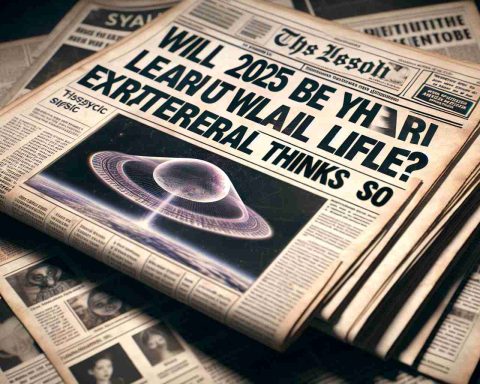- Enrico Fermi’s question, “Where is everybody?”, sparked the ongoing investigation known as the Fermi Paradox.
- The Fermi Paradox highlights the contradiction between the high probability of extraterrestrial life and the lack of evidence for their existence.
- Research through initiatives like SETI seeks to uncover signs of intelligent life beyond Earth, but results have been inconclusive.
- Popular culture often reflects human fears through alien narratives, rather than providing accurate representations of extraterrestrial beings.
- Stories of advanced civilizations continue to proliferate despite the absence of scientific proof, raising questions about humanity’s uniqueness in the universe.
- The mystery deepens as we ponder why we have not yet encountered signals or signs from potential alien civilizations.
In 1950, renowned physicist Enrico Fermi sparked a cosmic inquiry that continues to baffle scientists today. While casually lunching with colleagues, Fermi posed a simple yet profound question: “Where is everybody?” He challenged the notion that Earth is unique, suggesting that if intelligent life existed on other planets, some of these civilizations could have evolved eons ago, spread across the galaxy, yet have remained inexplicably silent.
This puzzling conundrum, now known as the Fermi Paradox, has inspired extensive research into the possibility of extraterrestrial intelligence through the Search for Extraterrestrial Intelligence (SETI) initiative. Despite over six decades of exploration, the cosmos remains eerily silent.
In popular culture, aliens are depicted in myriad forms, often reflecting human fears and societal critiques rather than genuine alien encounters. From H.G. Wells’ iconic The War of the Worlds—which painted a picture of imperial anxiety—speculative fiction has spun narratives of intergalactic war and alien empires that mirror human conflicts.
Yet, the irony persists: while stories of advanced civilizations proliferate, the scientific community has yet to uncover even the faintest signs of life beyond Earth. Theories abound—could we be a “rare Earth,” a unique oasis amidst an otherwise barren universe?
As we gaze into the stars, Fermi’s question lingers: if we are not alone, then why are we still waiting for a cosmic hello? The quest for answers continues, fueling our imagination and our quest for connection among the galaxies.
Unraveling the Fermi Paradox: New Insights and Questions
The Fermi Paradox remains an intriguing puzzle in the scientific community regarding the existence of extraterrestrial intelligence and the apparent silence of the cosmos despite the vast number of stars and potentially habitable planets. Recent studies have provided new insights and perspectives on this age-old question.
New Insights
# 1. Technosignatures: The New Search Frontier
Recent advancements in technology have enabled scientists to look for technosignatures—evidence of advanced civilizations, such as artificial light or radio signals emanating from far-off planets. Missions like the James Webb Space Telescope are set to enhance our ability to detect these signatures, providing fresh avenues for exploration.
# 2. The Great Filter Hypothesis
One of the most debated propositions regarding the Fermi Paradox is the Great Filter theory, which suggests there is a stage in the evolution of life that is exceedingly hard to surpass. This filter could either be behind us (indicating that the emergence of intelligent life is rare) or ahead of us (implying that self-destruction is a likely fate for advanced civilizations).
# 3. Astrobiology and the Extremophiles
Research into extremophiles—microbes that thrive in extreme conditions—has expanded our understanding of where life may exist. These discoveries indicate that life could survive in environments previously thought to be uninhabitable, suggesting a higher likelihood of life beyond Earth than previously assumed.
Key Questions About the Fermi Paradox
# Q1: What are the implications of the Great Filter theory for humanity?
The Great Filter implies that either intelligent life is extremely rare, or civilizations inevitably self-destruct before achieving interstellar communication. Understanding where we stand in this filter could inform our actions to prevent self-destruction and enhance our chances of lasting survival.
# A1: If our challenges are insurmountable, it suggests we must proactively safeguard our species through global agreements on technology, resource use, and environmental sustainability to avoid falling into the self-destructive category.
# Q2: How can we enhance our search for extraterrestrial intelligence?
With the advent of new technologies, we can adopt a multi-faceted strategy that includes the use of advanced telescopes to identify exoplanets, the deployment of AI for analyzing vast datasets for signals, and international collaboration on SETI projects.
# A2: Enhancing our search involves funding and collaboration across countries, increasing the capabilities of observatories, and refining our signal detection methods to include a broader range of possible communications beyond what we currently understand.
# Q3: What are the ethical considerations of contacting extraterrestrial civilizations?
As we endeavor to find extraterrestrial intelligence, ethical questions arise regarding the implications of establishing contact. What responsibilities do we bear towards potentially less advanced civilizations, and what protocols should we follow to avoid inadvertently disrupting their worlds?
# A3: It is crucial to develop a framework that guides humanity’s approach towards contact, emphasizing respect for other civilizations and prioritizing non-interference as a key principle in our cosmic engagements.
Suggested Links
For further information on this captivating topic, explore these resources:
– SETI Institute
– NASA
– Science Magazine
As humanity continues to look toward the stars, the quest to resolve the Fermi Paradox may reveal profound insights not only about intelligent life beyond our planet but also about the future of our own civilization.



















